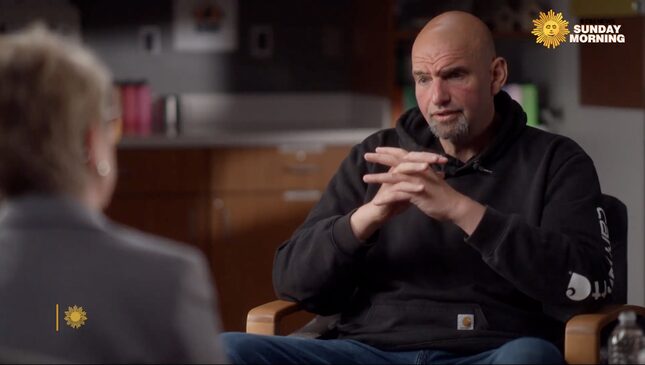John Fetterman Opens Up About ‘Downward Spiral’ of Depression After Winning Senate Race
"I never had any self-harm, but I was indifferent [to living], though,” the recovering senator told CBS's Jane Pauley of his mental health struggles.
Politics

On Friday, freshman Sen. John Fetterman (D-Pa.) was released from Walter Reed hospital, where he’d checked himself in about six weeks ago to receive treatment for clinical depression that had become severe. In his first interview about his treatment, Fetterman—who’s now in remission—said that winning a crucial and at times ugly Senate race in November kicked off a “downward spiral” of depression that left him unable to get out of bed. It most certainly didn’t help that conservatives—and the media in general—had an ableist meltdown over his recovery from a stroke, which can itself lead to clinical depression. He’s set to return to the Senate the week of April 17, when the session resumes after a recess.
CBS Sunday Morning anchor Jane Pauley interviewed Fetterman at Walter Reed two days before his release. Appearing alongside his wife, Gisele Barreto Fetterman, he opened up to Pauley about the weeks after winning the key race against Dr. Mehmet Oz and flipping a seat from red to blue. “It’s like, you just won the biggest, you know, race in the country. And the whole thing about depression is that objectively, you may have won, but depression can absolutely convince you that you actually lost,” he said. “And that’s exactly what happened. And that was the start of a downward spiral.”
Fetterman had a stroke in May 2022, and experts have noted that depression is unfortunately common after a stroke. The senator struggled to get out of bed, wasn’t eating or drinking fluids, and had stopped engaging with “most things that I love in my life.” He managed to travel to Washington, D.C., to be sworn in on January 3, but Pauley said people close to him said he “looked miserable and lost” on that day. “Yeah. Well, I was definitely depressed,” he laughed.
Pauley said she’d understood that Fetterman was “agnostic” about the prospect of continuing to live. “Yeah. Well, I never had any self-harm, but I was indifferent, though,” he said. “If the doctor said, ‘Gee, you have 18 months to live,’ I’d be like, ‘Yeah. Okay, well, that’s how things go.’” A concerned doctor started to make arrangements at Walter Reed, and Fetterman agreed to go.
-

-

-

-

-

-

-

-

-

-

-

-

-

-

-

-

-

-

-

-

-

-

-

-

-

-

-

-

-

-

-

-

-

-

-

-

-

-

-

-








































